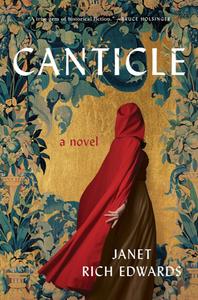
 Janet Rich Edwards's fierce, luminous debut novel, Canticle, follows a young woman named Aleys in 13th-century Belgium as she seeks a deeper connection with God and runs afoul of the ambitious men who control the local church. Edwards's narrative explores dynamics of love and power, the complexities of faith, and the quiet influence of the beguines, a group of independent women who live in community, committed to serving God and one another.
Janet Rich Edwards's fierce, luminous debut novel, Canticle, follows a young woman named Aleys in 13th-century Belgium as she seeks a deeper connection with God and runs afoul of the ambitious men who control the local church. Edwards's narrative explores dynamics of love and power, the complexities of faith, and the quiet influence of the beguines, a group of independent women who live in community, committed to serving God and one another.
Growing up the daughter of a wool merchant in Bruges, Aleys loves her mother's retellings of the stories of saints and prophets depicted in their family's illuminated psalter. When her mother dies, Aleys refuses marriage to an associate of her father and joins the Franciscan friars, a group of poor but pious men whose simple life appeals to her. They find shelter for her in the beguines' compound, the begijnhof, where she meets the wise magistra Sophia, leader of the community; surly Katrijn, who represents the beguines at the wool market; and Marte, a maid who serves the beguines. Friar Lukas, Aleys's Franciscan spiritual adviser and mentor, is convinced she has been touched by God, but his brother, local bishop Jaan, is both unsettled by Aleys's spiritual passion and determined to use her as a pawn in his power games.
Edwards draws sharp contrasts between Aleys's genuine search for faith and the calculating power plays undertaken by Jaan and other religious leaders. While Aleys is intelligent and hungry for spiritual experience, her youth and naivete leave her susceptible to others' machinations. Meanwhile, Jaan's focus on gaining influence and wealth leaves him contemptuous of his pious brother, and Lukas grows jealous of Aleys's intimate connection to the divine. Though Sophia is a thoughtful leader, even she cannot protect Aleys from Jaan's schemes, and both Katrijn and Marte are hiding secrets of their own.
While Canticle explores church politics (with parallels to modern-day leaders who seek control above all), it also draws a lavish portrait of the beguines and examines the phenomenon of vernacular translations of scripture. Jaan, Friar Lukas, and others are concerned about Dutch translations of Bible stories spreading throughout their town; Edwards weaves this historical reality into the story as a striking commentary on language, truth, and agency. As Aleys attracts more attention from Jaan and other corrupt church officials, she will be forced to face new kinds of trials, and redefine the meaning of devotion and sacrifice.
Thoroughly detailed and sensitively told, Canticle is an exploration of a young woman's hunger for a deeper purpose, a sharp-eyed examination of power's corrosive effects, and a testament to the impact of quiet, faithful service like that of the beguines. --Katie Noah Gibson, blogger at Cakes, Tea and Dreams
Shelf Talker: Janet Rich Edwards's fierce, luminous debut novel explores dynamics of power, agency, love, and faith through the life of a spiritually hungry young woman in 13th-century Belgium.

